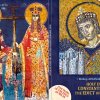Супруга Џорџа Војиновића Џенет саопштила је да је он преминуо у сну, јавља АП, а преноси Тајм.
Џорџ Виктор Војиновић је био амерички политичар из Охаја. Рођен је 1936. у Кливленду, као дете оца Србина, пореклом са Кордуна, и мајке Словенке. Био је најстарији од шесторо деце.
Агенција АП наводи да је Војиновић био умерен политичар.
Залагао се за штедљивост у свом личном али и јавном животу. Оспоравао је смањивање пореза које је увео председник Џорџ Буш, као и Бушову ратну стратегију за Ирак.
Као члан Републиканске странке био је на многим значајним положајима.
Седам година је био на позицији градоначелника Кливленда, а осам година, у два наврата, гувернер Охаја - од 1991. до 1998. године, да би поново био изабран 1994. године.
Функцију сенатора из Охаја обављао је 12 година, све до 2011. године.
Почетком 2009. објавио је да се неће кандидовати за трећи мандат, јер жели да се повуче и проведе више времена с породицом.
Гувернер Охаја Џон Кејсик назвао је Војиновића "ујединитељем који је мислио изван оквира, никада се није предавао и марљиво је до краја животра радио на спровођењу идеја у које је веровао".
Извор: РТС





